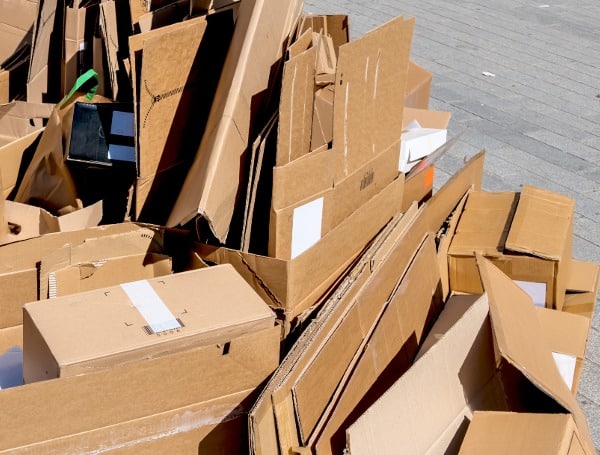TAMPA, Fla. – Barbara Smith wrote in the Business Insider in August that cardboard is the “beige gold,” and globally criminals are making millions as e-commerce booms. This and other changes are strangling recycling systems and the profits of companies and local authorities. Recycling has not escaped the rapid shifts brought on all sectors by 2020.
As consumers unpack box after box, tucked inside another box surrounded by styrofoam, different problems arise in addition to the illegal trade that is skyrocketing.
The recycling systems have not and can not keep up, especially after Covid-19 shut down many operations for sometime. The shut-down of facilities occurred as management regrouped and armed staff with Personal Protection Equipment and new protocols.
Meanwhile the massive demand shifted from “clean,” commercial cardboard and paper sources, to a “dirty,” residential overload of waste, cardboard and a mix of both. Much of the waste had to burned. In July, for example, Hillsborough and Pasco counties burned approximately 20,000 tons of waste the recycling systems could not handle.
Problems and Solutions for Residential Recycling
Ninety percent of all products in the U.S. are shipped in corrugated cardboard boxes. Commercially, these boxes are typically used once and recycled. Residential trends show single-use boxes are often reused for storage and become contaminated. Other bad habits have led the recycling industry to ask that residents stick to the basics. Now as we approach 2021, these are increasingly important to meet recycling goals.
Florida has struggled to keep up with the goals set in 2008 by the Florida Legislature’s Energy, Climate Change Economic Security Act which established a statewide, weight-based recycling goal of 75 percent by 2020. The last time the state met the “staggered,” projected goals set by the act was in 2014. Here are a few suggestions to help meet increasing demands:
- Stop “wishcycling,” a term described by Sandy Skolochenko for those who put something in a recycling bin without checking whether it is actually recyclable. Skolochenko is a Business Development Specialist with the Department of Environmental Quality (DEACS). In an article for Coastal Review published this month, Skolochenko highlights the system overflow of home garbage and emphasizes not to throw masks and gloves away in recycling bins.
- Understand the oil and other residue left on simple things like a pizza box gum up the system. Plastic bags are notably at the top of the “do not recycle” list. The advice for recycling plastic bags is to return them to the stores. Remember not to recycle masks and gloves but do properly dispense of them in waste bins.
- Stick to the basics of residential recycling: plastic bottles, tubs, jugs and jars, glass bottles, metal cans, paper and cardboard. Again, the emphasis is on basic and clean recycling to help get through this particularly industrial, commercial and residential recycling shift.
Tampa Is Close to Striking Beige Gold
Seeds for a blossoming partnership have been planted at the Port of Tampa for a new cardboard and paper recycling plant. The Tampa site is one of only two in North America of its kind. The reported $180 million facility is the product of New Jersey-based Kamine Development Corporation (KDC which creates sustainability infrastructure) and Celadon, a technology company. The deal does include almost 100 jobs.
Wade Elliott, Vice President of Business Development Port of Tampa told The Free Press, “This is a great project for our region. The proposed facility will enhance sustainability and benefit the port regarding exports of cargo.”
As step one in the process, the Hillsborough County Commissioners held a public hearing in October approving the plans thus far. The vote is going to the Tampa City Council today. Check back for an in-depth feature from The Free Press.

